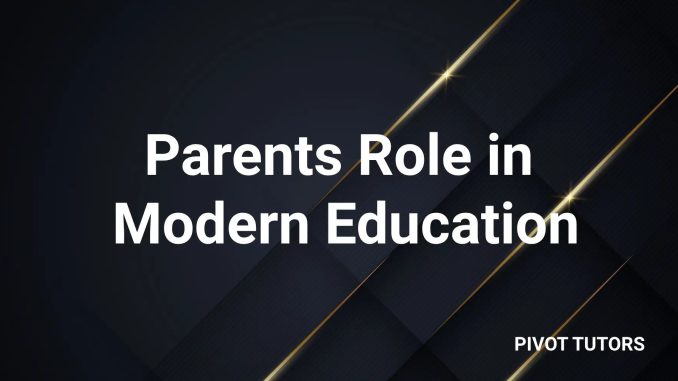
The landscape of education has undergone a profound transformation in recent decades, moving far beyond the traditional model of classrooms and textbooks to embrace digital tools, personalized learning pathways, and a global perspective. In this evolving environment, the role of parents, once primarily seen as supporting actors, has become increasingly central and multifaceted. No longer are parents simply responsible for ensuring attendance and completing homework; their active engagement, advocacy, and collaborative spirit are now recognized as indispensable pillars supporting a child’s holistic development and academic success. Modern education demands a partnership, and parents are undeniably the primary and most influential stakeholders in this crucial alliance.
At its core, the parental role in modern education begins with fostering a positive learning environment at home. This extends beyond merely providing a quiet space for homework; it involves cultivating a culture of curiosity, intellectual exploration, and a love for learning. Parents who read with their children, engage in conversations about current events, visit museums, or even simply demonstrate enthusiasm for new knowledge, instill a foundational appreciation for education that transcends the confines of the classroom. For instance, a parent who helps their child research a topic they’re passionate about, even if it’s outside the school curriculum, teaches valuable research skills and reinforces the idea that learning is a lifelong, engaging pursuit. This home environment serves as the first and most enduring classroom, shaping a child’s attitudes towards knowledge and their own capabilities.
Beyond nurturing a supportive atmosphere, parents are increasingly expected to be active participants in their children’s academic journey. This involves more than just attending parent-teacher conferences; it means understanding the curriculum, communicating regularly with educators, and staying informed about their child’s progress and challenges. Modern schools often provide online portals for grades and assignments, and parents who regularly check these resources can identify issues early and collaborate with teachers on solutions. For example, if a child is struggling with a particular subject, a proactive parent can work with the teacher to implement strategies at home, reinforcing concepts or providing additional support. This open line of communication ensures that both home and school are aligned in their efforts to support the child’s learning, creating a cohesive and effective educational ecosystem.
Furthermore, parents often serve as crucial advocates for their children, particularly in navigating personalized learning paths or addressing specific educational needs. Modern education strives for inclusivity, recognizing that every child learns differently. Parents are uniquely positioned to understand their child’s individual strengths, weaknesses, and learning styles. Whether it’s advocating for special accommodations, seeking out advanced placement opportunities, or exploring alternative educational models like homeschooling or unschooling, parents play a vital role in ensuring their child receives an education tailored to their unique requirements. Consider a child with a learning disability; the parent’s diligent research, communication with specialists, and unwavering advocacy within the school system are often the key to unlocking appropriate support and resources, allowing the child to thrive.
The digital age has also added another layer of responsibility to the parental role. With ubiquitous access to information, and often misinformation, parents are increasingly tasked with guiding their children through the complexities of online learning, digital literacy, and responsible internet use. This involves not only setting boundaries and monitoring screen time but also teaching critical thinking skills to discern reliable sources, understand digital footprints, and navigate online interactions safely and ethically. A parent helping their teenager evaluate the credibility of an online news article or discussing the long-term implications of social media posts exemplifies this modern aspect of parental involvement. They become mentors in the digital sphere, preparing their children for an interconnected world where information flows freely and discerning judgment is paramount.
Finally, in an era where educational models are constantly innovating, parents are also emerging as key contributors to the broader educational community. This can manifest in various ways, from volunteering in school activities and participating in parent-teacher associations to providing feedback on school policies and even engaging in community-wide discussions about educational reform. Their collective voice and active participation can significantly influence the direction and quality of local schools and educational initiatives. For instance, parents lobbying for improved STEM programs or advocating for better arts education can directly impact the resources and opportunities available to all students in a given district. This collaborative spirit transforms education from a top-down mandate into a community-driven endeavor, with parents as active co-creators of their children’s future.
In conclusion, the role of parents in modern education has evolved from a supportive function to an essential, dynamic partnership. They are the initial architects of a child’s learning ethos, active collaborators with educators, fierce advocates for individual needs, crucial guides in the digital landscape, and influential voices within the broader educational community. Recognizing and embracing this expanded role is not just beneficial for the individual child; it is fundamental to fostering a robust, adaptable, and truly effective educational system capable of preparing future generations for the complexities and opportunities of the 21st century.